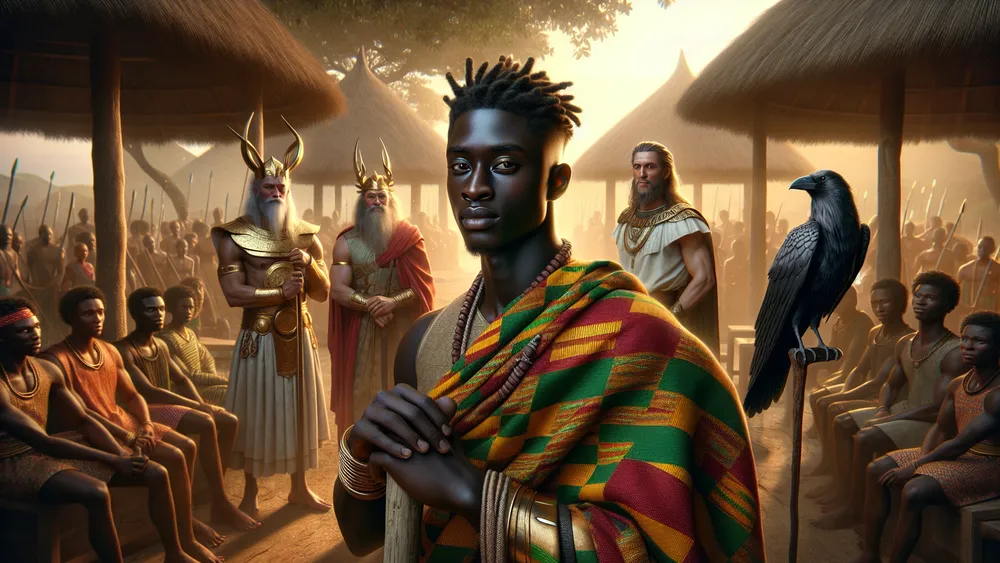Kweku Tsin In West African Folktales: Anansi’S Clever Son
In old West African stories, the name Kweku Tsin might not be as well-known as his father’s, Anansi. But still, he is a very important person in Akan mythology. Anansi, a clever spider who plays tricks and causes trouble, is different from Kweku Tsin, who is known for being smart, calm, and able to find solutions.
Key Points:
- Kweku Tsin is Anansi’s son, but he is more patient and solves problems with smart thinking instead of tricks.
- His stories mean that wisdom and planning ahead are just as important as being clever.
- He often fixes things after Anansi causes trouble, balancing the two ways of thinking.
- Some of his most famous stories talk about solving mysteries, stopping magical trouble, and bringing back the sun.
- Unlike many trickster figures, Kweku Tsin thinks before acting and does not cause problems just to see what happens.
- His stories, coming from Akan mythology, spread over time to places like the Caribbean and the Americas.
- More than just clever, Kweku Tsin stands for making good decisions, thinking long-term, and never rushing into things without a plan.
His stories talk a lot about how he fixes problems by using clear thinking and good planning. That makes him different from his father, who often relies on tricks and clever lies. A lot of old West African stories focus on teaching people right from wrong through the actions of their characters. Because of this, Kweku Tsin seems to be a more honest and fair person than Anansi.
While Anansi fools others to get what he wants, Kweku Tsin often stops bad situations from getting worse by being careful and thinking ahead. His stories focus on how being wise, patient, and a good leader matter a lot. That is why many people find him an interesting person in African storytelling traditions.
In many old stories from different places, fathers and sons often deal with problems in their own ways. One thinks fast, the other takes their time. This happens in Greek mythology, too. Odysseus, who is tricky and takes risks, is not like his son, Telemachus, who is more careful and patient. The same kind of difference exists between Anansi and Kweku Tsin.
When we look at Kweku Tsin’s stories, we can understand how African storytelling does not always focus on just being clever. It also talks about thinking ahead and making the right choices.
Kweku Tsin: Overview and Key Facts
| Category | Details |
|---|---|
| Full Name | Kweku Tsin (some people spell it as Kwaku Tsin) |
| Where the Stories Come From | Akan mythology, part of the wider West African storytelling tradition |
| Who His Parents Are | Son of Anansi, the well-known trickster in Akan stories |
| What He Is Like | Smart, good at finding answers, patient, and often seen as more honest than Anansi |
| His Role in Stories | Someone who solves problems, helps with difficult tasks, or fixes things when Anansi causes trouble |
| Why He Matters | He stands for wisdom, planning ahead, and solving problems instead of just playing tricks |
| Famous Stories About Him | – The Secret of Immortality: He tries to discover how to live forever but cannot because people have limits. <br> – The Mystery of the Missing Food: He uses reason to catch a magical thief. <br> – How Kweku Tsin Brought Back the Sun: A story about him getting the sun back after it was taken. |
| How He Is Different From Anansi | Anansi wins by using tricks. Kweku Tsin, on the other hand, does well by thinking smart, planning, and not giving up. |
| How His Stories Spread | Because people told his stories as they moved across the world, they became part of folk legends in places like the Caribbean and the Americas. |
Where Kweku Tsin’s Story Begins in West African Myths
If you want to truly understand who Kweku Tsin is, then you should first look at where he comes from in old West African stories. A long time ago, people began telling stories about him, and over many years, these stories did not disappear. Instead, they were told again and again, moving from parents to children and beyond.
Even though he is often connected to his father, Anansi, Kweku Tsin became different from him in many ways. His name appears in many stories from the Akan people, and those stories were never just for entertainment. Each one meant something important. They helped people see what the Akan believe and teach about life, problems, and choices.
Who is Kweku Tsin?
Kweku Tsin is an important person in Akan stories, and he is the son of Anansi, the well-known trickster. Even though he is like his father in some ways because he is also clever, he does things differently.
Instead of using tricks to get what he wants, he thinks carefully instead of tricking people, which makes him stand apart from Anansi, who uses fast thinking but sometimes only cares about himself. People remember him in stories because he is great at solving big problems, which means he often succeeds in ways Anansi does not.
He finds out things that others do not know, sometimes tricks magical creatures when he must, and brings things back to how they should be when something is wrong. He does not win by tricks or lies. He wins by using clear thinking, patience, and careful planning.
Not only do people in Akan culture tell stories about him, but other West African traditions include him, too. Over time, because people carried his stories to other places, they spread to the Caribbean and the Americas. In some of these places, Kweku Tsin became part of Anansi’s stories, not as a trickster but as the one who understands things more deeply.
This difference makes it clear that in African myths, intelligence is not only about being clever but also about making the right choices for the future.
Kweku Tsin, the son of Anansi, is remembered in Akan and other West African stories for solving big problems through patience and planning instead of tricks, which makes him very different from his father.
How Kweku Tsin and Anansi Are Connected
Kweku Tsin and Anansi are related, but they do not behave the same way in stories. Anansi tricks people – he fools humans, animals, and even powerful spirits when it benefits him. He does this because it helps him get what he wants, even if it means making things worse for other people. But Kweku Tsin uses patience and careful thinking instead. He finds answers to hard problems without depending on lies or tricks.
Even though they are different, in some stories, they work together. Anansi might start a situation by causing trouble, but in the end, Kweku Tsin finds the smart way to fix it. In other stories, Anansi is the reason things go wrong, and Kweku Tsin has to make things right again. Together, they make things balanced in West African stories.
Anansi wants quick rewards, but Kweku Tsin focuses on long-term success, which means their stories help explain two different ways of being smart: one is about using tricky methods to win now, while the other is about thinking ahead and choosing what is right for the future.
These ideas appear a lot in Akan storytelling, and over time, they spread to other West African cultures and even to the Caribbean and the Americas through storytelling traditions.
Legendary Tales of Kweku Tsin
If you want to understand how Kweku Tsin thinks and solves problems, you should look at the old stories where he is important. People have told these stories for a long time, and in them, he is always the main person solving problems.
When you read these stories, something becomes clear: he is clever, stays calm, and does not give up even when things are hard. He does not just deal with small problems – he faces things beyond the ordinary. In many of these stories, strange and powerful things appear, and he must figure out how to handle them without using tricks or lies. That is what makes him different.
The Story of Kweku Tsin and the Secret of Immortality
In one of the most famous stories about him, Kweku Tsin sets out on a big journey to learn the secret of never-ending life. Unlike Anansi, who always looked for ways to help himself, Kweku Tsin did not do this for selfish reasons. He wanted to know the truth about life and death.
He heard stories about powerful spirits, ones who knew secrets others were not meant to know. He crossed huge lands, one after another, moving through deep forests and places where no ordinary person could go. Some warned him not to continue. He listened but did not stop. At every step, something stood in his way.

- A River That Erased Memories – If he fell in, he would forget everything. He used a rope made from special plants and pulled himself across.
- A Spirit’s Riddle – A powerful spirit blocked his way, demanding he answer a question. He thought carefully and got it right.
- Souls Trapped in a Cave – Many had failed before him. He did not hurry past. He listened to them, and their warnings helped him later.
- A Fruit That Would Make Him Live Forever – The last spirit gave him a choice. If he ate it, he would never go back home, never see his family again.
He had won. He could live forever.
But he could not let go of his family and the life he knew, and that stopped him from choosing to live forever. He turned back, leaving the fruit behind. He did not return with never-ending life. He returned with knowledge instead.
Kweku Tsin and the Mystery of the Missing Food
Food kept disappearing. Every morning, the village’s food storage had less than before, but no one had ever seen who took it. Some blamed animals. Others thought it must be someone from the village. But Kweku Tsin had another idea. He believed it was a spirit. Anansi would have tried to fool the thief.
Kweku Tsin did something else. Instead of setting traps or lying, he paid attention to details and thought carefully. He studied the problem, looking at when food disappeared and which foods were taken first. He did not rush to act. That was what made him different.

He used several steps to find out the truth:
- Watching everything closely – He stayed up at night, checking what went missing first and if there was a pattern.
- Trapping without harming – Instead of scaring the thief away, he spread fine ash on the ground to catch footprints.
- Looking at the prints – When he saw them, he knew right away. No human made them. No animal did either.
- Talking instead of fighting – He waited until he had enough proof. Then, instead of attacking the thief, he spoke to it. He asked why it took the food, then gave a solution that worked for both sides.
With patience and careful thinking, Kweku Tsin does not use tricks. He does not use force either. Instead, he solves the problem in a way that keeps peace in the village. That is why people say he is wise.
How Kweku Tsin Brought Back the Sun
The sun disappeared. A sorcerer, angry at how strong the sun was, took it and locked it away. After that, everything started going wrong. The world became dark. No light in the sky. Without the sun, nothing worked. The plants stopped growing. The animals became weak. The people were afraid. Some waited, hoping things would fix themselves.
But Kweku Tsin did not wait. Instead of jumping in without thinking, he studied the problem first, making sure he knew what to do. He learned where the sun was hidden and discovered what the sorcerer feared most. Then, he made a plan. He watched carefully, avoided the traps, and finally, entered the place where the sun was locked away. He freed it.
And just like that, the world changed again. Light returned.
Stories about stealing and bringing back the sun exist in many cultures. Here are some similar myths:
| Culture | Mythological Figure | Role in Bringing Back the Sun |
|---|---|---|
| Egyptian | Ra | Fights a great monster every night so the sun can rise. |
| Greek | Apollo | Moves the sun across the sky so there is always light. |
| Japanese | Amaterasu | Stays hidden until a trick brings her back, allowing the sun to shine again. |
| Inuit | The Raven | Takes the sun from someone who kept it for himself and gives it to everyone. |
Because Kweku Tsin is smart, plans ahead, and never quits, he does not only help himself – he helps everyone. He does not look for rewards. He does not trick anyone. He brings back the sun because it is the right thing to do.
Kweku Tsin carefully studies the problem, finds out where the sun is hidden, and rescues it, bringing light back to the world.
What Kweku Tsin Stands For in African Folklore
Kweku Tsin is not just smart. He keeps going, no matter how difficult things get. But there is more to him than that. His stories also tell us something bigger. They help us see what people believe is right and valuable. If we want to understand why he matters, we should look at how people see him in their stories.
He is not just a clever character, but someone who represents deeper beliefs passed down through generations. Instead of asking what makes him different from others like him, we should ask something else: what does Kweku Tsin mean in these stories?
What Does Kweku Tsin Represent?
Kweku Tsin is smart, but not because he tricks people. He is wise, thinks ahead, and waits when he needs to. That is why he stands apart from Anansi. Kweku Tsin stands for thinking carefully and planning far ahead. Anansi wins fast by tricking others.

Kweku Tsin, however, takes a different path. He solves problems not by taking shortcuts, but by using patience and thinking carefully. He does not rush. When there is a problem, he studies it, understands it, and only then does he act. For many, he is what a leader should be.
A leader who does not act too fast, but thinks about everything first. That makes him different from Anansi, but they also go together in some ways. Anansi tricks and wins fast. But Kweku Tsin wins in a different way – by knowing, planning, and never acting without reason.
How Kweku Tsin Compares to Other Trickster Figures
Loki, Hermes, and the Raven are tricksters in old stories. They use tricks, cause trouble, or find clever ways to get what they want. Unlike them, Kweku Tsin does not act without thinking. He chooses to solve problems instead of playing tricks. Some tricksters work fast. They take what they want. They use words or tricks to make things happen. But Kweku Tsin does not rush.

Instead, he carefully watches, thinks, and acts only at the right time. The Raven, like Anansi, tricks others to get what he wants, often acting without thinking about what might happen next. Kweku Tsin, though, stops and makes a careful plan before doing anything. He does not mess things up just to see what will happen.
When there is a problem, he finds a way to fix it.
Here is a list that makes the differences clear:
- Ways Kweku Tsin is similar to tricksters:
- Ways Kweku Tsin is different from tricksters:
What makes him different is that he focuses on wisdom and patience. Other tricksters play games, cause trouble, and work for themselves. Kweku Tsin does not. He takes his time, makes smart decisions, and finds solutions that help more than just him.
Key Figures in African Mythology
In African stories, there are gods, spirits, and heroes. They affect how people believe and live. Each one has a different role in the stories, but all are important.
Some of the most famous ones include Anansi, a spider that uses clever tricks; Nyame, the most important sky god in Akan beliefs; Olorun, a great creator god in Yoruba stories; and Eshu, a god who controls messages and what happens to people.
Among them are figures like Kweku Tsin, who take part in stories that help people understand how the world works, what is right and wrong, and why things happen the way they do. If you want to see more gods from Africa, you can check out this full list with all African Gods.
FAQs
1. Was Kweku Tsin more intelligent than Anansi?
Whether Kweku Tsin was more intelligent than Anansi depends on how intelligence is defined, as Anansi excelled in cunning and trickery, while Kweku Tsin demonstrated strategic wisdom and patience.
2. What is the moral of most Kweku Tsin stories?
The moral of most Kweku Tsin stories emphasizes the value of patience, intelligence, and strategic thinking in overcoming challenges.
3. Is Kweku Tsin considered a deity or just a folk hero?
Kweku Tsin is considered a folk hero rather than a deity, as his stories emphasize human qualities like intelligence, patience, and perseverance rather than divine powers.
4. How did Kweku Tsin’s legends spread outside Africa?
How Kweku Tsin’s legends spread outside Africa is largely due to the oral traditions carried by West African diasporas through the transatlantic slave trade, which helped preserve and adapt his stories in the Caribbean and the Americas.







